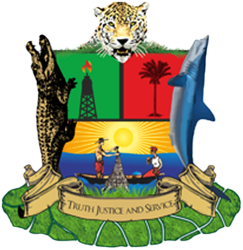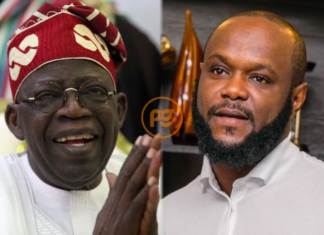By C. Don Adinuba
Bayelsa State is a quintessence of how crisis of social values is at the root of the economic underperformance of societies and nations.
Speaking on television networks in the first week of this month, Governor Serieka Dickson ascribed his inability to pay the workforce in almost half a year to humungous debts accumulated by his predecessors.
Many governors borrow massively from banks and issue to the accountant general of the federation an irrevocable standing payment order (ISPO) to deduct the loans from source and pay creditors.
“I did not see what they did with all the monies they borrowed,” Dickson moaned. Though he did not reveal his predecessors who put Bayelsa in peonage, the list may include Diepreye Alamieyeseigha. If that is so,then Dickson must accept responsibility for the state’s economic mess.
Only last April, he organised a high profile State Executive Council (SEC) meeting in honour of Alamieyeseigha, attended by former President Goodluck Jonathan and Alamieyesieghe’s widow, where he proudly announced the renaming of the state’s banquet hall and the road linking Yenagoa and Alamieyeseigha’s hometown of Amassoma in the late governor’s name.
He also announced that a mausoleum would be built for Alamieyesiegha in Ijaw Heroes Park. At the requiem on April 19 for the former governor, who was jailed for plundering the state (not Nigeria), Dickson called him repeatedly “a true hero”.
The governor general of the Ijaw nation, as Alamieyeseighe was fondly called, was one Nigerian public officer whose looting is fairly well documented.
In 2010, seven years after he was impeached, the British government returned to Bayelsa State five million pounds stashed away in the United Kingdom by Alamieyesieghe who had been arrested in September 2012 at Heathrow Airport for money laundering.
He had purchased five properties in London, kept one million pounds in cash in his London home and left $2.7 million in an account with the Royal Bank of Scotland.
He also had houses in the United States and South Africa – all acquired while he was governor of one of Nigeria’s poorest states.
While being tried in London in 2005, he escaped to Nigeria where he hoped that the constitutional immunity conferred on him as a governor would save him.
Many Africans do not seem to appreciate the correlation between high ethical standards and economic development. A society which allows its people to indulge in massive corruption cannot develop economically.
In 1958, the distinguished American sociologist, Edward Banfied, called attention to this reality through his seminal book, The Moral Basis of a Backward Society.
Banfield did a study of southern Italy which is called the Third World of Western Europe because of its economic backwardness, unlike northern Italy which is as developed as any other part of the First World.
The cultural values in southern Italy enable criminal organisations like the Mafia to reign supreme in cities like Sicily and Naples.
This great work by Banfield practically faded from the radar screen of many Western scholars until 1997 when Francis Fukuyama published his second book Trust: the Social Virtues and the Creation of Prosperity in which the polyvalent intellectual argues that the difference between poor and rich societies is the difference in the levels of social capital.
By social capital, Fukuyama means the stock of values like honesty, loyalty, integrity and trust. He calls societies with a substantial stock of these values high-trust ones and societies where the reverse is the case low-trust.
The examples Fukuyama cites for explaining why many nations in the Third World cannot build big businesses which outlive the founders and their families and consequently contribute significantly to national economic well being are arresting, but beyond the scope of this essay.
As a new millennium was about to dawn, Harvard University organised in 1999 a symposium to interrogate the powerful place of cultural values in societal and national development.
Papers delivered at the symposium were published the following year in Culture Matters: How Values Shape Human Progress, a book edited by Lawrence Harrison and Samuel Huntington.
In a penetrating introduction, Huntington, author of the magnus opus, The Clash of Civilisations and the Remaking of World Order, provides a glimpse into why Southeast Asian nations like South Korea and Singapore have recorded fantastic progress, despite the absence of natural resources, but not African countries like Ghana, in spite of the superabundance of resources like cocoa and gold.
Writes Huntington: “South Koreans valued thrift, education, organisation, and discipline. Ghanaians had different values. In short, cultures count”.
Despite its low population and relatively sparse population, Bayelsa receives one of the largest allocations from the federation account every month because it is a leading oil-producing state. Still, it owes workers for several months.
In contrast, a state like Anambra which receives almost an infinitesimal amount from the federation account and has a large population and a huge workforce, not only pays workers before month end but even increases salaries, employs more workers and continues with the construction of a large number of roads and state of the art aesthetic bridges.
Why wouldn’t Bayelsa be in financial doldrums when Dickson insists on holding up Alamieyeseigha as a role model in a state with personages like Larry Koinyan, Gabriel Okara and Mrs T. K. Agari, among numerous others who can hold their ground anywhere in the world intellectually and morally?
It should come to no one as a surprise that the incidences of contract padding and ghost workers in Bayelsa have been proved to be the worst in the whole country since Dickson, compelled by the ongoing economic crunch, began to check several leakages in the state’s treasury.
The terrible crisis of values is not peculiar to Bayelsa.
A major public housing estate in Abuja is named after Ibrahim Abacha for dying on a presidential jet on January 17, 1996 while frolicking with his girlfriend.
Kano State stadium is named after Sani Abacha, a pathological buccaneer, with the millions of dollars he looted still being returned to Nigeria 18 years after his death.
In Anambra, the military regime changed Achalla Road in Awka to Prince Arthur Eze Avenue, after Eze had received $110 million and a huge naira component from the African Development Bank for rural water supply and rural electrification in the old Anambra State and the building of an industrial development centre in Awka but did practically nothing.
Eze took over the chairmanship of Premier Breweries, the biggest industry in Anambra State and third largest brewery in Nigeria, and ran it aground.
He became chairman of Orient Bank and as he was about to ground it, Paul Ogwuma, as Central Bank of Nigeria governor, not only removed him but banned him from ever being on the board of any bank.
But in typical Nigerian fashion, President Goodluck Jonathan awarded him a high national honour. About two months ago, the University of Nigeria, Nsukka bestowed an honorary doctorate on him.
It is a shame that most Nigerian public officers do not know the close relationship between values and economic development. Worse, our universities are steeped in a profound moral cesspool.
• Adinuba is head of Discovery Public Affairs Consulting.













